Japan made them famous in the 1960s, South Korea has been marketing the concept for years and now Taiwan is designing some of the most luxurious love hotels in the business. In the last five-years, they have transformed their dated image of sleazy, windowless rooms into a multi-billion dollar industry.
"It is no longer necessary for lovers to resort to cheap or dirty rooms when they want to spend a few hours alone," said WeGo Taipei manager Henry Bai (
WeGo Motel (
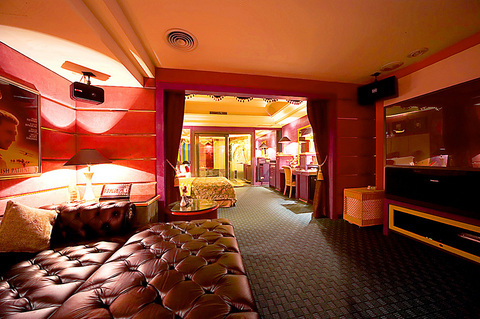
PHOTOS COURTESTY OF WEGO
"We don't want to convey a sex hotel image, so we don't put much sex equipment [paraphernalia] in the rooms. We are branding the love motel concept, with an emphasis on style and luxury," Bai said.
LOVE AND RIVALRY
Riding on the success of WeGo's hedonist paradise are a growing number of love villas in Taichung, and Kaohsiung, which boast larger, more extravagant rooms. One of the latest and most upscale additions to the market is Mulan Motel (
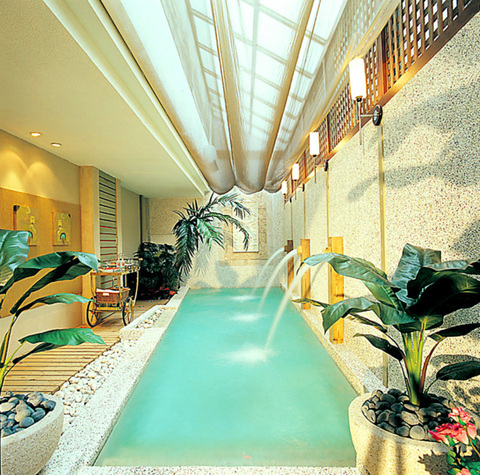
PHOTOS COURTESY OF IMORE
The high price of land in Taipei has kept WeGo's competitors to a minimum. On a similar sized plot of land, I MORE Motel (
Opened in December last year, I MORE's rooms are clearly bigger than those at WeGo, but use the same theme-style approach in their interior decoration. In addition to the queen-sized bedroom furniture is a variety of recreational equipment from big screen TV's (often more than one) and karaoke to rooms fitted with a private pool. Bathrooms are the main attraction, however, with a sauna, shower and party-sized hot tub in every room. The major difference between the two motels is I MORE's emphasis on sex with its sex-toy slot machines and selection of imported mechanical sex chairs. The motel also hired two actors to demonstrate 48 positions for an instructional program that plays on one of the many available adult channels.
Clients range in age from 25 to 50, but despite the queue of luxury sedans driving in, rooms are not always occupied by the wealthy.
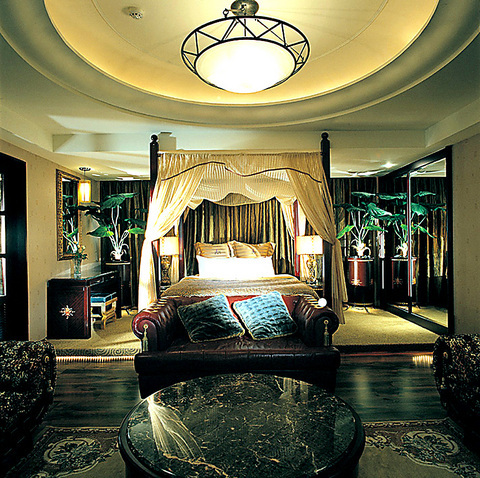
"Maybe they are not rich, but they will spend the money on a motel, because for a short time they can be treated and pretend like they are rich," said I MORE marketing manager Kyle Lai (
Wealthy or not, those dreams come with a hefty price tag.
A two hour "rest" at either motel can cost upward of NT$2,500, or NT$6,800 for 12 hours. For a large number of couples, however, it remains a small price to pay. An average day at WeGo Taipei sees 500 couples, which even at the least expensive rate of NT$1,500, translates as NT$750,000 per day. Weekends and rainy days draw an even larger turnover resulting in a queue of cars waiting three to four hours, Bai said. Both have overfill parking lots for patrons willing to wait it out.
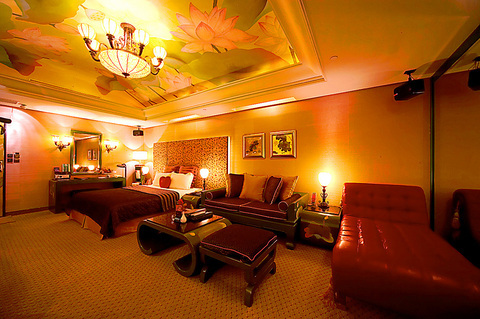
CLEANING UP
Once inside guests are treated with superior service. Both WeGo and I MORE have ISO 9001 certification, which assumes an international standard of quality in the hospitality industry. Cleaning procedures demand three housekeepers to clean one room, which is inspected prior to being rented out. Both motels claimed housekeepers spend 20 to 30 minutes per room. Bathrooms and bedrooms are also stocked with a wide selection of toiletries and confectioneries that compare, if not exceed in quantity, those found in a five-star hotel. Despite the comparable room prices and standards to fashionable business hotels, love motels are for couples only. No more and no less than two people are permitted in a room at one time, and no entrance is permitted to anyone below18 years of age.
Love motels, new and old, are viewed as models of discretion, according to Lai, who assures anonymity and said guests rarely see the staff.
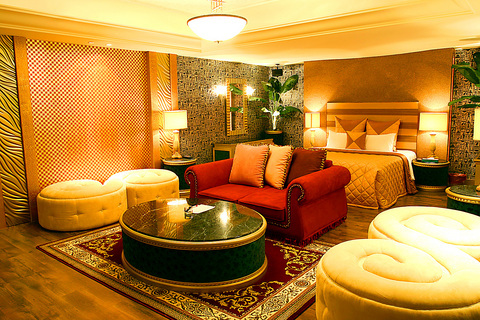
Normally, a receptionist sits in a booth at the entrance of the building greeting drivers and directing them to a room. A garage door automatically opens and closes once the car enters. Any room service is delivered to a special area outside the door, after which the wait staff leaves and notifies the guests by telephone that the food has arrived. I MORE has a separate hallway accessible only to the housekeeping "or guests in need of an escape route," Lai said.
WeGo doesn't have a secret passageway but it does have a pre-recorded soundtrack device that, with a a flick of the remote, will reproduce the background noise heard at a MRT station, beach or office when making a phone call.
Designed for love, the motels are setting hospitality standards. "Romance motels are designing some of the most luxurious, high-tech rooms in the country," Lai said.

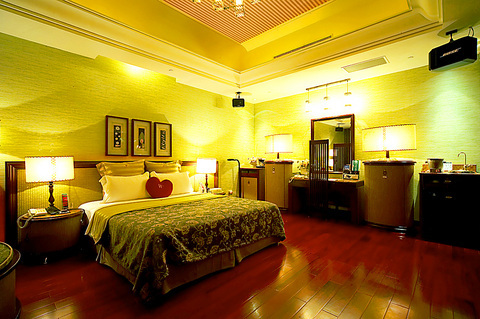

The Directorate-General of Budget, Accounting and Statistics (DGBAS) told legislators last week that because the Chinese Nationalist Party (KMT) and Taiwan People’s Party (TPP) are continuing to block next year’s budget from passing, the nation could lose 1.5 percent of its GDP growth next year. According to the DGBAS report, officials presented to the legislature, the 2026 budget proposal includes NT$299.2 billion in funding for new projects and funding increases for various government functions. This funding only becomes available when the legislature approves it. The DGBAS estimates that every NT$10 billion in government money not spent shaves 0.05 percent off
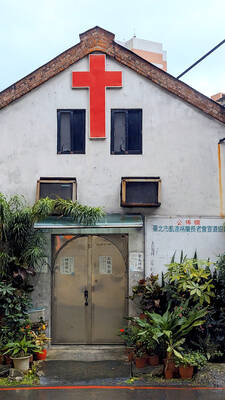
Dec. 29 to Jan. 4 Like the Taoist Baode Temple (保德宮) featured in last week’s column, there’s little at first glance to suggest that Taipei’s Independence Presbyterian Church in Xinbeitou (自立長老會新北投教會) has Indigenous roots. One hint is a small sign on the facade reading “Ketagalan Presbyterian Mission Association” — Ketagalan being an collective term for the Pingpu (plains Indigenous) groups who once inhabited much of northern Taiwan. Inside, a display on the back wall introduces the congregation’s founder Pan Shui-tu (潘水土), a member of the Pingpu settlement of Kipatauw, and provides information about the Ketagalan and their early involvement with Christianity. Most

The People’s Republic of China (PRC) was out in force in the Taiwan Strait this week, threatening Taiwan with live-fire exercises, aircraft incursions and tedious claims to ownership. The reaction to the PRC’s blockade and decapitation strike exercises offer numerous lessons, if only we are willing to be taught. Reading the commentary on PRC behavior is like reading Bible interpretation across a range of Christian denominations: the text is recast to mean what the interpreter wants it to mean. Many PRC believers contended that the drills, obviously scheduled in advance, were aimed at the recent arms offer to Taiwan by the

Like many retirement communities, The Terraces serves as a tranquil refuge for a nucleus of older people who no longer can travel to faraway places or engage in bold adventures. But they can still be thrust back to their days of wanderlust and thrill-seeking whenever caretakers at the community in Los Gatos, California, schedule a date for residents — many of whom are in their 80s and 90s — to take turns donning virtual reality headsets. Within a matter of minutes, the headsets can transport them to Europe, immerse them in the ocean depths or send them soaring on breathtaking hang-gliding expeditions